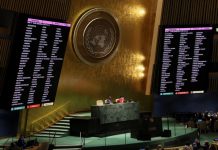Threats to the United States posed by al Qaeda from Afghanistan have been “significantly degraded,” Secretary of State Antony Blinken said in an interview with ABC tv’s programme This Week on Sunday.
Blinken defended President Joe Biden’s decision to withdraw all US troops from America’s longest war arguing the main objectives of disrupting the terrorist group that carried out the September 11 attacks had been achieved.
“We went to Afghanistan 20 years ago, and we went because we were attacked on 9/11, and we went to take on those who had attacked us on 9/11, and to make sure that Afghanistan would not again become a haven for terrorism directed at the United States or any of our allies and partners,” Blinken said. “And we achieved the objectives that we set out to achieve.”
“Al Qaeda has been significantly degraded. Its capacity to conduct an attack against the United States now from Afghanistan is not there,” he added. “And of course, Osama bin Laden was brought to justice 10 years ago.”
Biden announced on Wednesday that the remaining US troops in Afghanistan will leave by September 11, the 20th anniversary of the terrorist attack. A previous agreement struck with the Taliban by the Trump administration set the withdrawal date at May 1, but that deadline was seen as logistically unrealistic for removing all US troops.
Biden took the decision against the advice of military leaders who argued for keeping a US presence on the ground.
The decision has been criticised by some former officials, including former CIA director and former commander of US forces in Afghanistan retired General David Petraeus, who argued the move would destabilise the Afghan government and allow terrorist groups such as al Qaeda and the Islamic State to regroup.
But Blinken said the decision was the result of “a very deliberate and fully informed process” and argued the threats to the US have shifted in the two decades since war began. The US also has “the means to see if there is a resurgence, a reemergence of a terrorist threat from Afghanistan,” he said.
“So the president felt that as we’re looking at the world now, we have to look at it through the prism of 2021, not 2001,” Blinken said.
“The terrorism threat has moved to other places,” he added. “And we have other very important items on our agenda, including the relationship with China, including dealing with everything from climate change to Covid. And that’s where we have to focus our energy and resources.”









